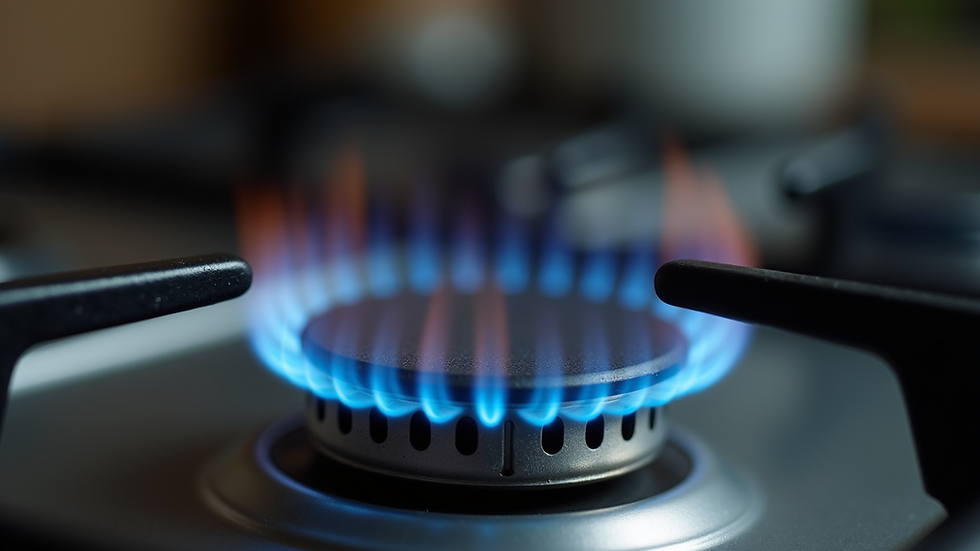Simple Maintenance Tips to Extend your Kitchen Appliance Lifespan
- limitlessimprovements
- Aug 11, 2025
- 3 min read
Updated: Nov 5, 2025
Home appliances are essential for everyday comfort and convenience. However, they can be costly to replace when they break down. The good news is that with simple and regular maintenance, you can significantly extend the lifespan of your appliances. This not only saves money but also reduces waste and the hassle of unexpected repairs.
In this article, you will find practical and easy-to-follow tips to keep your appliances running smoothly for years. Whether it’s your washing machine, refrigerator, or oven, these maintenance strategies will help you get the most out of your investment.
Why Regular Appliance Maintenance Matters
Regular appliance maintenance is crucial because it helps prevent small issues from turning into major problems. Appliances that are well cared for operate more efficiently, consume less energy, and perform better overall. For example, cleaning the lint filter in your dryer after every use can prevent overheating and reduce fire risk.
Ignoring maintenance can lead to:
Increased energy bills due to inefficient operation
Frequent breakdowns and costly repairs
Shortened appliance lifespan
Poor performance and inconsistent results
By dedicating a little time to upkeep, you can avoid these issues and enjoy reliable appliances that serve you well.

Essential Appliance Maintenance Tips for Every Home
Here are some straightforward maintenance tips that apply to most household appliances:
1. Clean Regularly
Dust, dirt, and grime can accumulate on and inside appliances, affecting their performance. For example:
Refrigerators: Clean the coils at the back or underneath every six months to improve cooling efficiency.
Ovens: Wipe spills immediately and deep clean monthly to prevent burnt-on food.
Dishwashers: Remove food debris from filters and spray arms regularly.
2. Check and Replace Filters
Many appliances have filters that need regular attention:
Air conditioners and heaters: Replace or clean filters monthly during heavy use.
Vacuum cleaners: Clean or replace filters to maintain suction power.
Water filters: Change according to manufacturer guidelines to ensure water quality.
3. Inspect Seals and Gaskets
Seals and gaskets keep appliances airtight or watertight. Damaged seals can cause leaks or energy loss:
Check refrigerator door seals for cracks or gaps.
Inspect washing machine door gaskets for mould or tears.
Replace any worn or damaged seals promptly.
4. Avoid Overloading
Overloading appliances like washing machines, dishwashers, and dryers can strain motors and reduce efficiency. Follow manufacturer load recommendations to prevent damage.
5. Use Appliances Properly
Always use appliances according to the user manual. For example, avoid using harsh chemicals in your dishwasher or overfilling your kettle. Proper use reduces wear and tear.

How to Perform Appliance Maintenance Safely
Safety should always be a priority when maintaining appliances. Here are some tips to keep in mind:
Unplug appliances before cleaning or performing any maintenance.
Use non-abrasive cleaners to avoid damaging surfaces.
Wear protective gloves if handling chemicals or sharp parts.
Follow the manufacturer’s instructions carefully.
If unsure about a repair or maintenance task, consult a professional.
Taking these precautions ensures that maintenance is effective and risk-free.
Practical Maintenance Tips for Specific Appliances
Clean the detergent drawer monthly to prevent mould buildup.
Run a hot wash cycle with vinegar or a washing machine cleaner every few months.
Check hoses for leaks or cracks and replace if necessary.
Defrost manually if your fridge does not have an automatic defrost feature.
Keep the fridge temperature between 3-5°C and the freezer at -18°C.
Avoid placing hot food directly inside to reduce strain on the compressor.
Ovens and Microwaves
Clean spills immediately to prevent burnt residues.
Use oven liners to catch drips and crumbs.
Check microwave door seals and hinges regularly.
Remove and clean filters monthly.
Run an empty cycle with a dishwasher cleaner to remove grease and limescale.
Check spray arms for blockages and clean as needed.

When to Call a Professional for Appliance Maintenance
While many maintenance tasks are simple and can be done at home, some situations require expert help:
Strange noises or smells coming from the appliance
Persistent leaks or water damage
Electrical issues such as tripping breakers
Complex repairs like motor or compressor replacement
Professional technicians have the tools and knowledge to diagnose and fix problems safely. Regular professional servicing can also extend the life of your appliances.
For comprehensive advice and services related to home appliance maintenance, consider consulting trusted local experts.
Keep Your Appliances Running Longer with Simple Steps
Extending the lifespan of your home appliances does not have to be complicated. By following these simple maintenance tips, you can enjoy better performance, lower energy bills, and fewer repairs. Remember to clean regularly, inspect parts, use appliances correctly, and seek professional help when needed.
Taking care of your appliances today means they will continue to take care of you tomorrow. Start your maintenance routine now and experience the benefits of well-maintained appliances in your home.



Comments